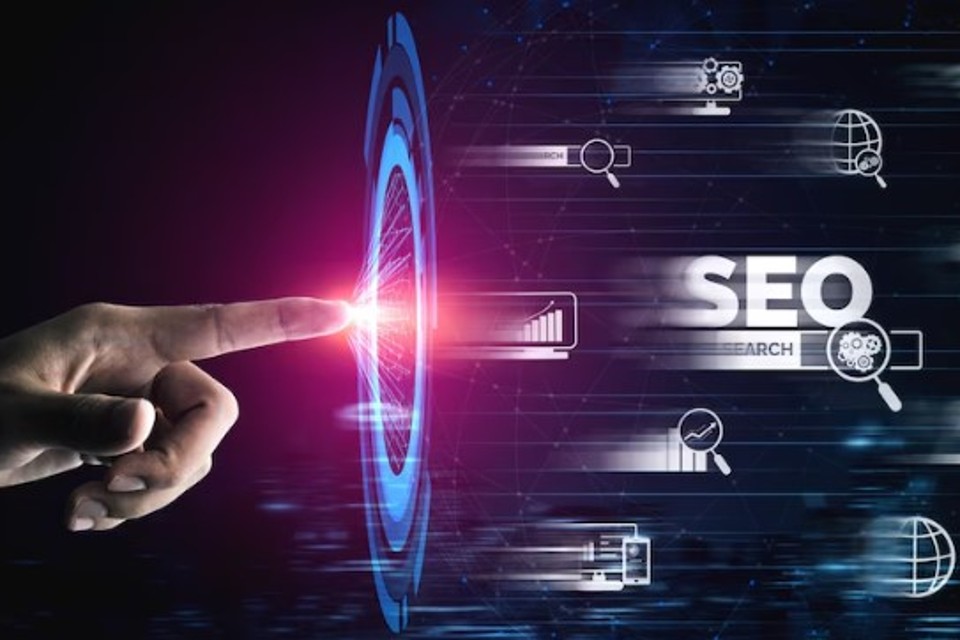
Artificial Intelligence (AI) has become an integral part of our lives, transforming various industries, and SEO is no exception. As search engines constantly evolve, AI algorithms play a crucial role in determining search rankings and delivering the most relevant results to users.
With AI technology, search engines can understand and interpret user intent better than ever. This means that SEO professionals need to adapt their strategies to stay ahead of the game. By leveraging AI, marketers can gain insights into user behavior, optimize content, and improve website performance to boost organic rankings.
But how exactly does AI impact SEO? From analyzing vast amounts of data to identifying trends, AI helps SEO experts identify the most effective keywords, create in-depth content, and optimize on-page elements. With AI-powered tools and technology, businesses can streamline their SEO efforts, save time, and improve their overall online visibility.
In this article, we will delve deeper into the role of AI in SEO, exploring the latest advancements, benefits, and best practices. Stay tuned to discover how AI can revolutionize your SEO strategies and help you achieve long-term success in the ever-changing digital landscape.
Understanding the impact of AI on search engines
Artificial Intelligence (AI) has revolutionized the way search engines function, transforming the landscape of search engine optimization (SEO). Search engines like Google, Bing, and Yahoo have increasingly integrated AI algorithms into their core systems, enabling them to better understand user intent, deliver more relevant search results, and continuously improve their performance.
At the heart of this AI-driven transformation is the ability of search engines to process and analyze vast amounts of data. By leveraging machine learning and natural language processing (NLP) technologies, AI-powered search engines can now comprehend the nuances of human language, recognize patterns, and make contextual inferences. This allows them to move beyond simple keyword matching and provide users with more personalized and meaningful search experiences.
The impact of AI on search engines is multifaceted. Search engines are now better equipped to understand the user’s search query, interpret their intent, and deliver results that are tailored to their specific needs. This has resulted in a shift in the way SEO professionals approach their strategies, as they need to adapt to the evolving search engine algorithms and focus on creating content that aligns with the user’s search intent, rather than simply optimizing for specific keywords.
How AI is reshaping keyword research
Keyword research has always been a critical component of SEO, as it helps businesses and marketers identify the terms and phrases that their target audience is searching for. However, with the advent of AI, the process of keyword research has become more sophisticated and efficient.
AI-powered tools and algorithms can now analyze massive datasets, including search engine data, user behavior, and industry trends, to uncover valuable insights that were previously hidden from traditional keyword research methods. These tools can identify long-tail keywords, understand search intent, and provide recommendations for related and relevant keywords that can be effectively targeted.
Moreover, AI-driven keyword research can also help identify emerging trends and anticipate changes in user search behavior. By analyzing patterns and user interactions, AI algorithms can predict which keywords are likely to become more or less popular in the future, allowing SEO professionals to stay ahead of the curve and adjust their strategies accordingly.
The role of AI in on-page optimization
On-page optimization is a crucial aspect of SEO, as it involves optimizing various elements of a website to improve its visibility and ranking in search engine results. AI has played a significant role in enhancing on-page optimization strategies, making the process more efficient and effective.
One of the key areas where AI has had a significant impact is in the optimization of content. AI-powered tools can analyze the content on a website, identify areas for improvement, and provide recommendations for enhancing the quality, relevance, and readability of the content. This includes suggestions for improving the structure, tone, and overall user experience, all of which can contribute to better search engine rankings.
Additionally, AI can be used to optimize other on-page elements, such as meta tags, image alt text, and URL structure. By analyzing the performance of these elements and making data-driven recommendations, AI-powered tools can help SEO professionals ensure that their websites are fully optimized for search engines, leading to improved visibility and higher organic traffic.
AI-powered content creation and optimization
Content is the backbone of any successful SEO strategy, and AI has played a transformative role in the creation and optimization of content. AI-powered tools and technologies can now assist in the entire content creation process, from ideation to publication.
One of the primary ways AI is shaping content creation is through the use of natural language processing (NLP) and machine learning algorithms. These technologies can analyze existing content, identify topics and subtopics, and generate new content that is tailored to the specific needs and interests of the target audience. This allows businesses to create high-quality, engaging content at scale, without the need for extensive manual effort.
Furthermore, AI can be used to optimize content for search engines. By analyzing the performance of existing content, AI-powered tools can provide recommendations for improving the structure, tone, and overall quality of the content. This includes suggestions for incorporating relevant keywords, improving readability, and enhancing the user experience, all of which can lead to better search engine rankings and increased organic traffic.
Leveraging AI for link building and off-page SEO
Link building and off-page SEO have long been essential components of a comprehensive SEO strategy, as they help to improve a website’s authority and credibility in the eyes of search engines. AI has also made significant inroads in this area, enabling SEO professionals to streamline their link-building efforts and achieve better results.
One of the key ways AI is transforming link building is through the identification of high-quality, relevant link opportunities. AI-powered tools can analyze vast datasets, including website metrics, content quality, and industry trends, to identify the most valuable and authoritative websites for potential link placements. This allows SEO professionals to focus their efforts on the most promising link-building opportunities, rather than wasting time on less effective strategies.
Additionally, AI can be used to automate certain aspects of the link-building process, such as outreach and relationship-building. By leveraging natural language processing and sentiment analysis, AI-powered tools can help SEO professionals craft personalized outreach messages, track the progress of their campaigns, and optimize their strategies based on the results.
AI-driven data analysis and SEO performance tracking
Data analysis and performance tracking are essential components of any successful SEO strategy, as they provide the insights and metrics needed to measure the effectiveness of your efforts and make informed decisions. AI has revolutionized the way SEO professionals approach data analysis, enabling them to gain deeper, more actionable insights from their data.
AI-powered analytics tools can process and analyze vast amounts of data from various sources, including website analytics, search engine data, and social media metrics. By leveraging machine learning algorithms, these tools can identify patterns, trends, and anomalies that would be difficult for human analysts to detect. This allows SEO professionals to make more informed decisions, optimize their strategies, and track the performance of their campaigns with greater precision.
Moreover, AI can also be used to automate certain aspects of data analysis and reporting, freeing up SEO professionals to focus on more strategic tasks. AI-powered tools can generate customized reports, provide real-time insights, and even make recommendations for improving SEO performance based on the data analysis.
The future of AI in SEO and its implications
As AI continues to evolve and become more sophisticated, its impact on the field of SEO is only expected to grow. In the years to come, we can anticipate even more transformative changes in the way search engines function and how SEO professionals approach their strategies.
One of the key areas where AI is likely to have a significant impact is in the realm of predictive analytics. By leveraging advanced machine learning algorithms and vast datasets, AI-powered tools will be able to forecast future trends, anticipate changes in user search behavior, and provide SEO professionals with the insights they need to stay ahead of the curve.
Additionally, the integration of AI with other emerging technologies, such as voice search and natural language processing, will further enhance the ability of search engines to understand user intent and deliver more personalized and relevant results. This will require SEO professionals to adapt their strategies, focusing on creating content and optimizing their websites in ways that cater to these new search paradigms.
Challenges and concerns with AI in SEO
While the integration of AI in SEO has brought about numerous benefits, it has also introduced some challenges and concerns that SEO professionals need to be aware of.
One of the primary concerns is the potential for AI-powered algorithms to introduce biases and inconsistencies into the search engine results. As AI systems are trained on large datasets, they may inherently reflect the biases and assumptions present in those datasets, leading to skewed or inaccurate search results. SEO professionals need to be vigilant in monitoring the impact of AI on their search engine rankings and work closely with search engine providers to ensure that the algorithms are fair and unbiased.
Another challenge is the increasing complexity of SEO strategies as AI-powered tools and technologies become more sophisticated. As search engines continue to evolve, SEO professionals will need to stay up-to-date with the latest advancements and adjust their strategies accordingly. This may require a significant investment in time, resources, and continuous learning to ensure that their SEO efforts remain effective.
Additionally, the reliance on AI-powered tools and algorithms raises concerns about the transparency and interpretability of the decision-making process. SEO professionals need to understand the inner workings of these AI systems to ensure that they are making informed decisions and not blindly relying on the recommendations provided by the tools.
Conclusion: Embracing AI for better SEO results
Artificial Intelligence has undoubtedly transformed the landscape of search engine optimization, and its impact is only expected to grow in the years to come. By embracing AI-powered tools and technologies, SEO professionals can gain a significant advantage in the competitive digital landscape, driving better results for their businesses and clients.
From improved keyword research and on-page optimization to more effective link building and data analysis, AI has the potential to streamline and enhance every aspect of the SEO process. By staying informed about the latest advancements in AI and adapting their strategies accordingly, SEO professionals can position themselves for long-term success in the ever-evolving world of search engine optimization.
As the role of AI in SEO continues to grow, it is essential for SEO professionals to approach this technology with a critical eye, addressing the challenges and concerns that arise. By working closely with search engine providers, staying up-to-date with industry trends, and continuously learning, SEO professionals can leverage the power of AI to deliver exceptional results and maintain a competitive edge in the digital marketplace.
